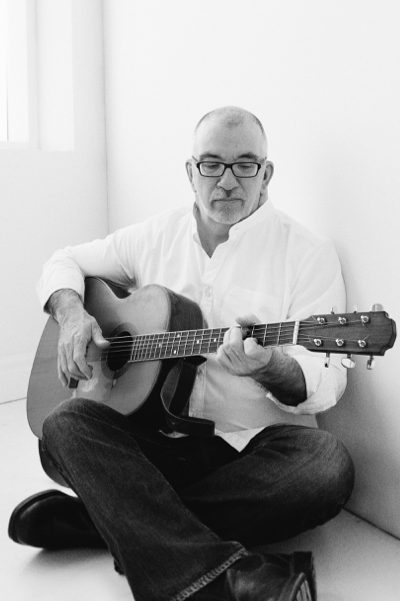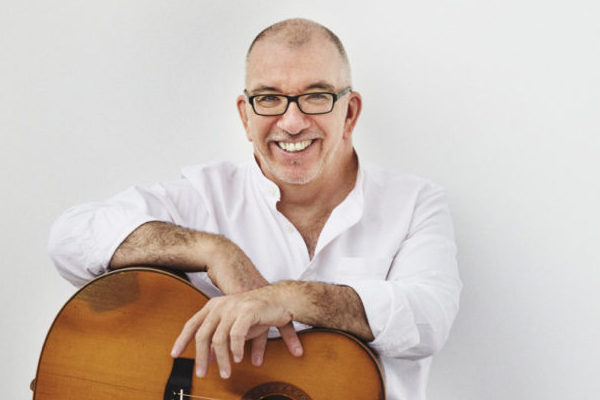Alayne McGregor
The pandemic hasn’t stopped James Keelaghan from connecting with audiences in Canada and beyond. He’s kept performing from home – an average of two online concerts a month – and used the experience to experiment with new show formats.
The Canadian folksinger, known for expressing his love of history in his songs, will headline the Ottawa Grassroots Festival this weekend, with his sound honed by his online experiences.
“A year ago I was ‘What?’ and now I’m all over it,” Keelaghan told The BUZZ. On Friday evening, he’ll be playing solo in his living room in Perth (with his dog the only live listener) and the music and video will then be streamed to festival attendees. The concert will feature old favourites and several new songs from an upcoming CD.
The festival, which runs Friday evening to Sunday afternoon, is completely online. It will also include performances by Kristine St-Pierre, Jessica Pearson and the East Wind, Leela Gilday, Sneezy Waters, Lynn Miles, Ian Tamblyn, Kimberly Sunstrum, and more in concerts, workshops, open stages, and a Sunday Gospel circle.
The Friday and Saturday evening concerts are ticketed; the daytime concerts and workshops are free. Pre-registration is required for all events at ottawagrassrootsfestival.com/tickets/ and will give you the Zoom link from which to see the concerts and workshops.
A tribute to Grassroots’ founder
Grassroots 2021 will close on Sunday with a musical tribute to Bob Nesbitt, the festival’s founder, who died in February. Keelaghan is also dedicating his Friday concert to Nesbitt.
Nesbitt was committed to “the idea of a festival that was, in fact, grassroots, that was, in fact, about building an experience for people that was in a way mediated by the people that he was building the experience for,” Keelaghan said. “He was so welcoming and he was so into building community. People like that are a treasure and they’re rare.”
The concert will also include the reappearance of Keelaghan’s 12-string guitar after many years. Last Sunday, “for the first time in years, I picked up my 12-string again and played a couple of tunes. I shook the dust out of it. That’s like being reacquainted with an old friend for me.”
He’s currently in the middle of recording a new CD, expected to be released next fall, “so I’ll be playing some new material. I’ll be playing some of the old hits, and just whatever I can fit in.”
Sound as good as a live concert
Keelaghan uses professional microphones and a professional video camera for his online concerts. He said he has refined his sound quality since his first online concert at the National Arts Centre in March 2020 – with the help of his regular bass player Hugh McMillan and Ottawa musician and Grassroots stream manager Graham Lindsey.
They’ve refined his home setup, “so that we’re getting the absolute best sound that we can out of it. The technical details: I run into a Allen & Heath Zed-10 mixing console which then goes via USB to the computer and then onto whatever platform we’re going to be using for the live stream. I’m basically getting the kind of sound that you would get if you were going to a concert. So there’s a really full guitar sound, there’s a really good vocal sound.”
Experimenting with new concert formats
When he was on the road pre-pandemic, Keelaghan said, he’d often be playing a similar repertoire at each concert. “You pop into these different towns and everybody has the things that they want to hear. And I’m always very open to taking requests from the crowd. But it does mean that sometimes you just end up playing the same thing from night to night to night, because people want your ‘hits’ as it were. And I have no problem doing that. You paid your two bits, you’re going to see the high diving act.”
With streaming, however, he’s tried new formats. “I think the key to the streaming thing – both for myself and for my core audience – is that you really try not to make it the same thing each time, you try to change it up a little bit.”
Some concerts are “just straight-up”; some are all-request. “I think the most fun one from last year was doing a reading of part of Anne of Green Gables for this thing called ‘Annedemic’ which a band called the East Pointers were running on Prince Edward Island. So I actually read a chapter of Anne of Green Gables, which was a riot!”
Last Sunday, he tried another format: revisiting his 1994 JUNO Award-winning album, My Skies. “I played the whole CD from beginning to end live, but also on the event I had a whole bunch of people who were involved in the recording who then came in and gave some of their memories. We talked a bit about how a particular song was recorded, and just went really deep into the process of recording that CD and all the memories that went with it. It was quite an emotional show.”
He’s also performed with other musicians in Songwriters in the Round events, and a Stan Rogers tribute. The next self-produced stream he’s planning will have him covering songs about history written by others, including traditional ballads on subjects like transported convicts or Napoleon’s exile on St. Helena.
“History is a big thing for me. So I’m compiling a big list of songs that deal with historical matters and I’ll do an entire show with those songs, but also between talking about the history of those events.”
The biggest constraint streaming imposes is not having audience feedback, Keelaghan said. “We feed off the energy that’s in the room, and to not have that energy coming back makes it a different thing to perform. I think initially it was a little bit difficult, but now I think a lot of us are figuring out how the medium works the best for us. It would be great to be playing in front of live people, because there’s just an energy there that’s not there when you do a stream.”
It can help to play for an audience for whom he’d previously played live, “especially like my home clubs like the Calgary Folk Club where the staff and the volunteers are all familiar to you, you’ve been seeing them for 30 years, and a lot of the audience looks familiar. That creates a different energy in the room than if you’re playing for an audience of total strangers who know nothing about your work.”
A new direction for festivals?
Keelaghan is also artistic director of two music festivals: the Summerfolk Festival in Owen Sound, and the Stewart Park Festival in Perth. Both have cancelled their in-person festivals this summer, although they may present other programming this fall.
When festivals return, he envisions them having an online as well as an in-person presence. “We’re going back to doing live music in a fantastic fashion but there will now be an option if you can’t make it for some reason or if you live half-way round the world, you’ll have the option to do that. We’ll do live music but we’ll build in abilities for people to stream and watch what it is that we’re doing live.”
“While I want to go back to having a festival, going back to normal, I don’t think going back to normal is necessarily what we’re going to do. I think we’re going to build something better.”
“Being a Trappist monk”
Keelaghan is particularly looking forward to performing with other musicians in the Grassroots daytime workshops this weekend. He’s scheduled to play with Jessica Pearson and Kristine St-Pierre in a songcircle at 3 p.m. on Saturday.
“I’m always happy to be performing, but I’m just SO happy to be seeing other people. And not only in the concert, but I’m also really looking forward to the daytime programming. That’s a little bit closer to a real festival experience for me. It’s not a real festival for me unless I can go to the workshops. And that’s where the best comedy happens too.”
For the past year, he’s been taking care of his two sons, 15 and 11, who are attending school virtually. They’re with him every second week, and “when the boys are over at their mom’s. I sort of go into being a Trappist monk.
“Aside from everything that I have to deal with in my own mind about having my livelihood changed, it is also mixed up with the changes that my boys are going through, not being in school and them not seeing friends. There’s been up times and down times and really putting a lot of effort into trying to keep the boys on an even keel. And they have been putting a lot of effort into trying to keep me on an even keel.
“My eldest son, one night he came down to dinner and he said ‘Dad, how old is the house?’ And I said it was built in 1898. And he goes, ‘So I’m not the only person who sat out a pandemic upstairs?’ And I went, ‘No… I hadn’t thought of that before. No, you’re not.’ In 1918-1919 there would have been a family in here that was doing exactly what we’re doing now, except they didn’t have PlayStation.”
Keelaghan said he hasn’t written directly about the pandemic in his new songs.
“I’m more interested in writing about – when I get around to writing about this – about the psychology of living within it without necessarily making reference to the thing itself. Although the pandemic has been the catalyst for a lot of us in terms of mental health issues, what the pandemic has really been doing is just highlighting our mental health issues. We had those issues before the pandemic – now they’re being brought out in pretty stark relief.”
He said he hoped its long-term effect would be to increase funding for public health and education. “Because we’re destroying ourselves. We’re destroying our ability to care for ourselves, We’re destroying our ability to take care of our communities. I would like to see the progressive agenda pushed to the absolute max.”


